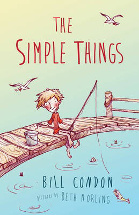The simple things by Bill Condon

Allen & Unwin, 2014. ISBN 9781743317242.
For every Christmas and birthday of his ten years, Aunt Lola has
sent Stephen $10.00 and, at his mother's insistence, he has
dutifully written to thank her. But he has never met her and
doesn't want to - what would a ten year-old city boy and an old
spinster aunt have in common? But as her 80th birthday
approaches, Stephen's parents take him for a holiday with her - and
she is all that he is expected: crotchety, pedantic, set in
her ways and a bit scary. How long can three weeks last? Like
many of today's children, because of scattered families he hasn't
had much to do with the elderly and he's a little afraid of what to
expect - not made any easier by his shyness. But as the days go by,
both begin to learn about each other and themselves, and the joys
the simple things of life can bring. Through Stephen's innocent
questions and observations, Aunt Lola learns to let go and Stephen
learns some surprising life lessons through simple things like
finally catching a fish and his discovery that Aunt Lola has kept
every one of those thank-you letters!
Tempered by dad-humour (a close relative to dad-dancing), this is a
gentle story written with compassion and understanding from both
points of view. Aunt Lola has kept a secret for over 60 years
that has tempered her view of the world, particularly trusting
others like her neighbour Norm, while Stephen learns to look beyond
his fears and begins to develop understanding and empathy. It is a
story of hope and joy that touches on some important issues about
relationships and acceptance by focusing on characters that are so
ordinary and real they bring the story to life. They
could be someone the reader knows.
Beth Norling's quirky line drawings at the beginning of each chapter
add an extra layer to what appears to be a simple book but really is
one of some complexity. It is skilfully crafted by an experienced
author (Condon says there were several complete rewrites of it
before he was satisfied) to help our younger readers realise that
older people are just another generation, not another race. As
our parents and grandparents live longer than they ever have, our
children are going to experience their ageing in a way that previous
generations have not, and so anything that builds a bridge of
understanding and acceptance (from both ends) has to be welcomed.
Old age is a privilege not a right, and there are many who don't get
to enjoy it, so there are many children who don't get to experience
the love and warmth that a great-grandma or great-grandpa can
offer. Having had the most loving grandparents and now being
one, I know the riches grandparents give and receive. Stephen
is lucky that he learns to love Aunt Lola and that love is
reciprocated. Would that all our kids could experience such a
special relationship.
This would be a perfect accompaniment to a study of family history
and the continuum of life.
Barbara Braxton